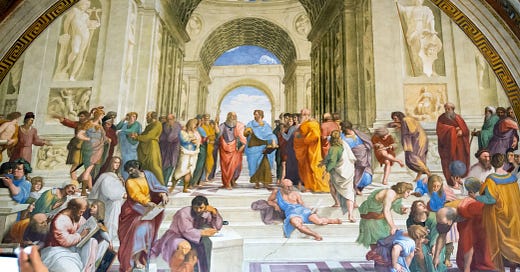Eclectic comes from the Greek eklektikos and was originally applied to ancient philosophers who were not committed to any single system of philosophy but instead selected whichever doctrines pleased them from every school of thought. – Merriam-Webster Dictionary
Don’t be just one thing. Don’t let just one idea hold you. Or one party, school, genre, or camp. Study the variety of wisdom scattered across the globe. Allow beauty and profundity to coalesce any way they will. In this venture we say – welcome to The Eclective, where fellow seekers follow the words of Ralph Waldo Emerson – “plunge into the sublime seas, dive deep, and swim far.”
Across the ages, human beings have proven too complex and expansive for any one theory or system to explain. In the century before the common era, Greek and Roman philosophers had so much to choose from. Heraclitus, Socrates, Plato, Aristotle, Epicureanism, Stoicism, along with the playwrights Aeschylus, Sophocles, and Euripides, all made the moral and physical world come alive. The soldier and historian Thucydides. The primal storyteller Herodotus. The lost poetess Sappho. The collector of mythologies Hesiod. Homer too, of course. Amid this mosaic of genius, a new class of thinkers called the eclectics arose. And every year the body of inspiration has accumulated. Why not examine, choose, and assimilate the best ideas around you? This doesn’t mean to fall for what flatters you most or tests you least. On the contrary, it means to enter a lifelong study of the greatest minds and hearts. Measure your walk by their pace.
Today we live in an ideological battleground, where the standard of virtue is total victory, a war that we must win and they must lose. The noise of contempt shuts out the beauty and awe around us. Voices of passion push us toward the party line, the one true vision, the never-ending grievance, the cause that cannot err. The social elect pressure the troops to conform and simplify our public discourse. The complexity of middle ground becomes lost. This monomania fails to see the bigness of life. Above and underneath the strife, the wisdoms of the world display a stunning array of diversity, but also flashes of unity. Sometimes a wide view sharpens the focus.
The way of eklektikos burdens individual judgment to weigh the worth of any set of ideas. The classics do not provide their own interpretation. Thinkers must ultimately do that for themselves, with the help of conversation and tradition. Eklektikos is not relativism, rather it is a kind of maximalism in the service of greater enlightenment. This ethos inspires trust in the coherence of truth, goodness, and beauty gathered from the many mines of human creativity.
Wisdom can be found everywhere, beaming in so many guises and shades that we fail to exhaust its light. As Jewish philosopher Maimonides said, “Accept the truth from whatever source it proceeds.” The more noble minds you encounter the more material you have to craft your own character.






Rumi says, “Inside the Kaaba, there is no Hajj ritual.” Millions of Muslims worldwide face the Kaaba within the city of Mecca five times each day to perform their daily prayers. Once a year, they perform the Hajj ceremony by circumambulating this holy house. In a line of poetry from his book of mystical stories, the Masnavi, Rumi appears to pose an intriguing question to these Muslims: “which way will you face to perform your prayers once you are inside the house?” The answer is that within the house, you are enveloped by truth on all sides. You can then pray facing any direction you choose. This suggests that truth cannot be confined to a single religion, ceremony, ritual, or direction. It is omnipresent. In the city of Bastam in eastern Iran, a mystic tour leader shared that the great Persian mystic Bayazid Bastami performed his daily prayers facing all directions. Shams, Rumi's spiritual teacher, said that if you remove the Kaaba from the midst of all the Muslims prostrating before it, you will see that people are prostrating to each other's hearts in every direction.